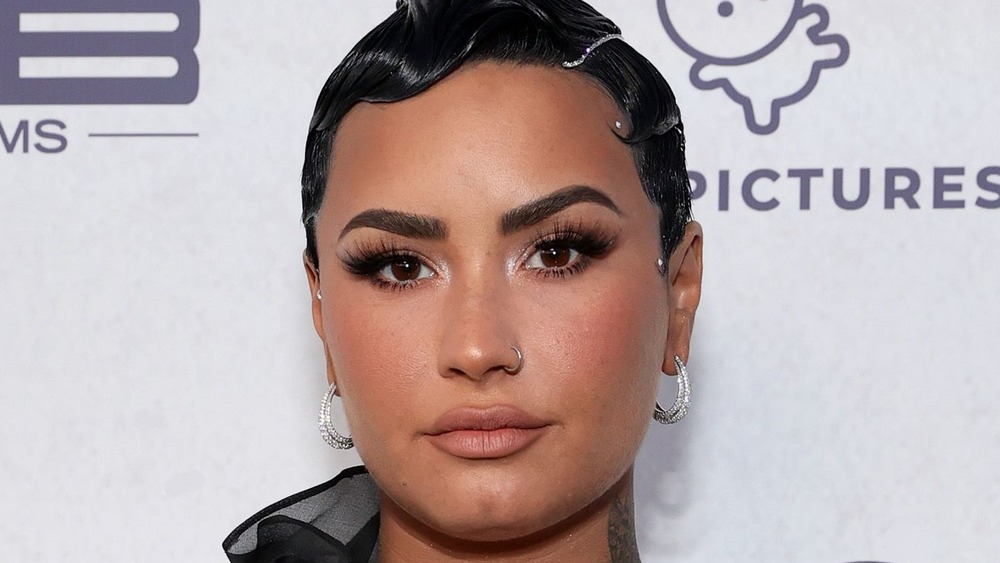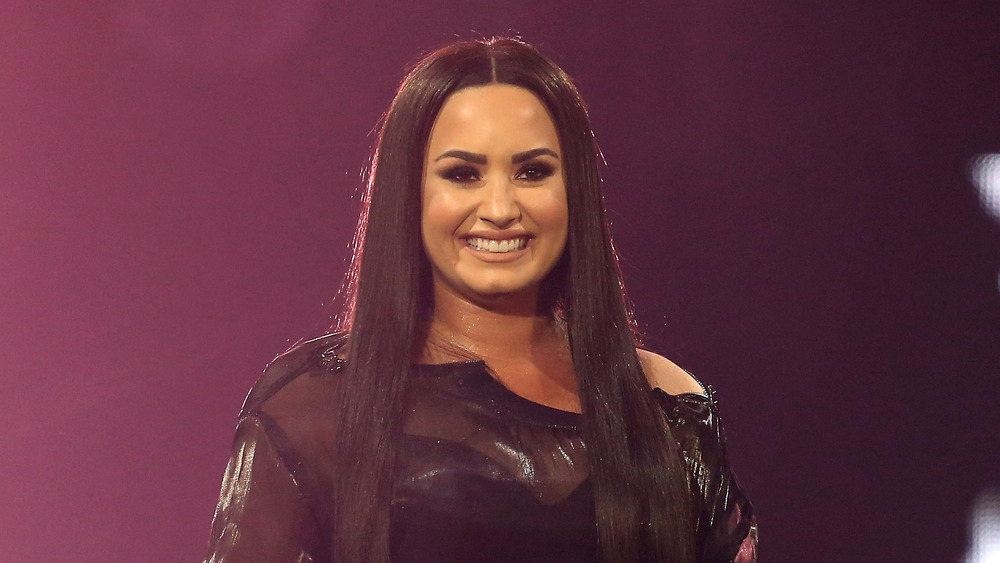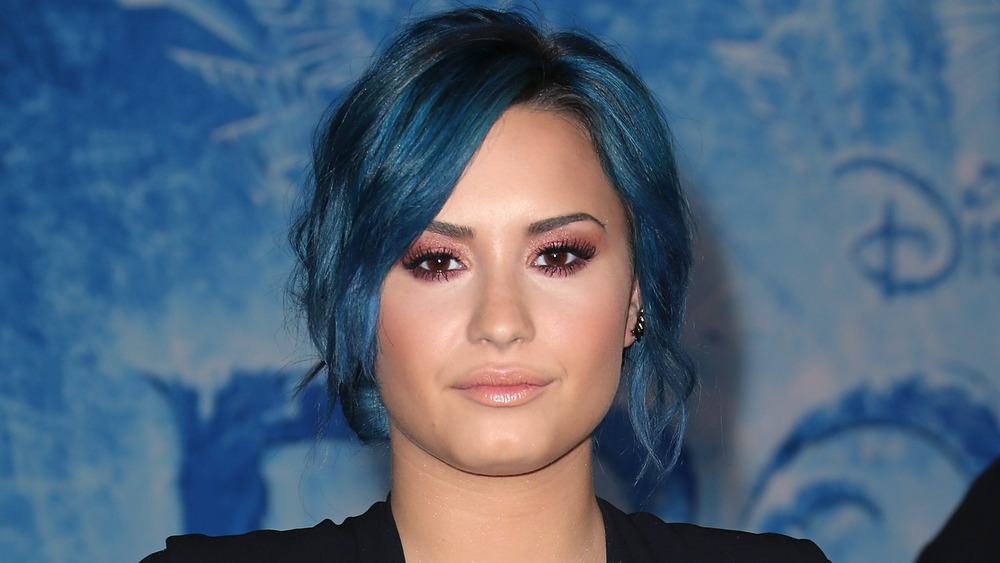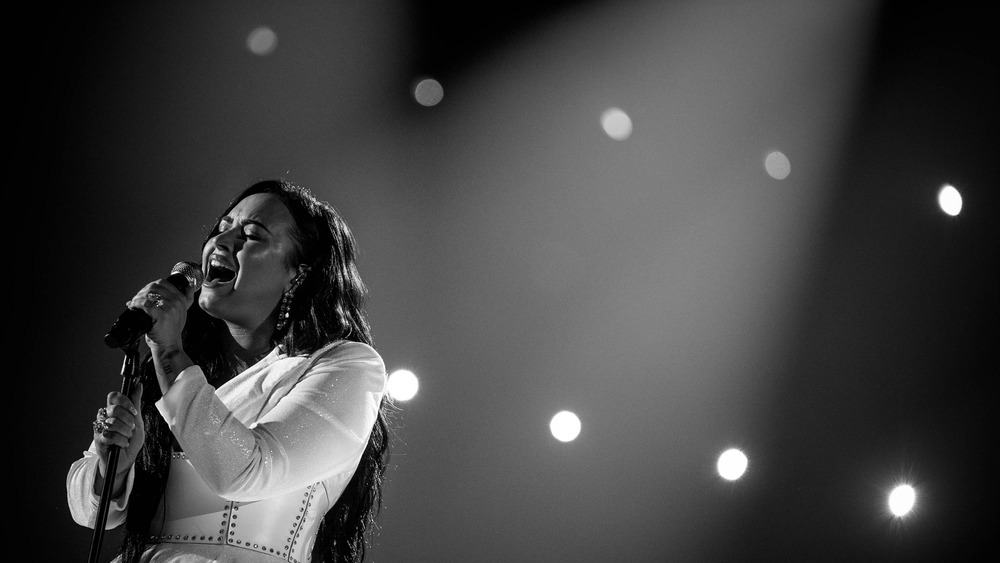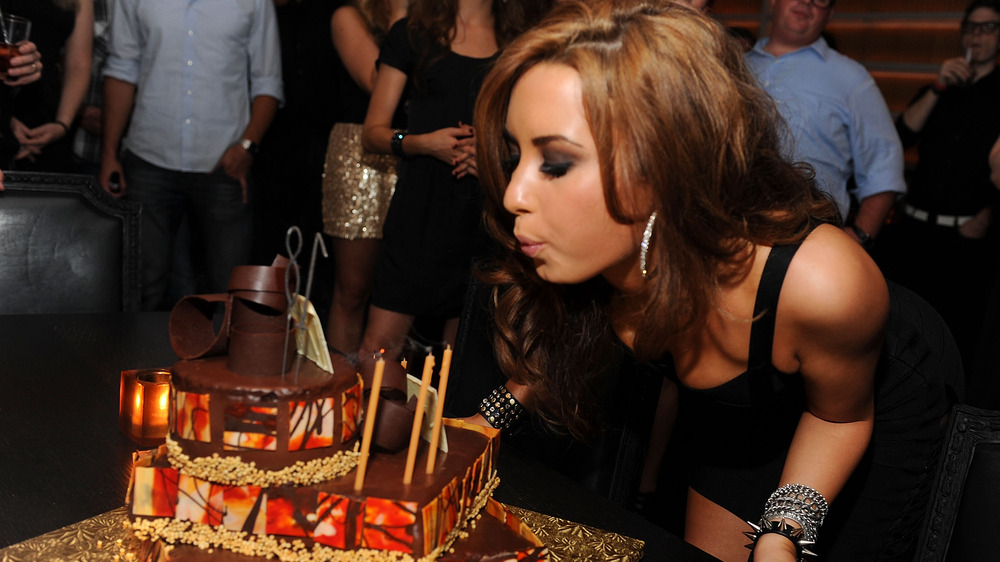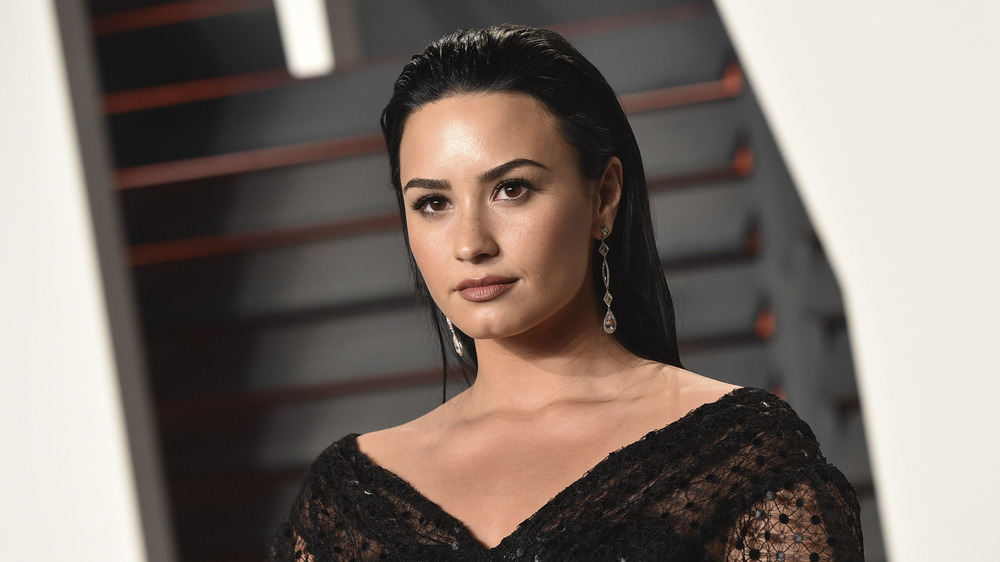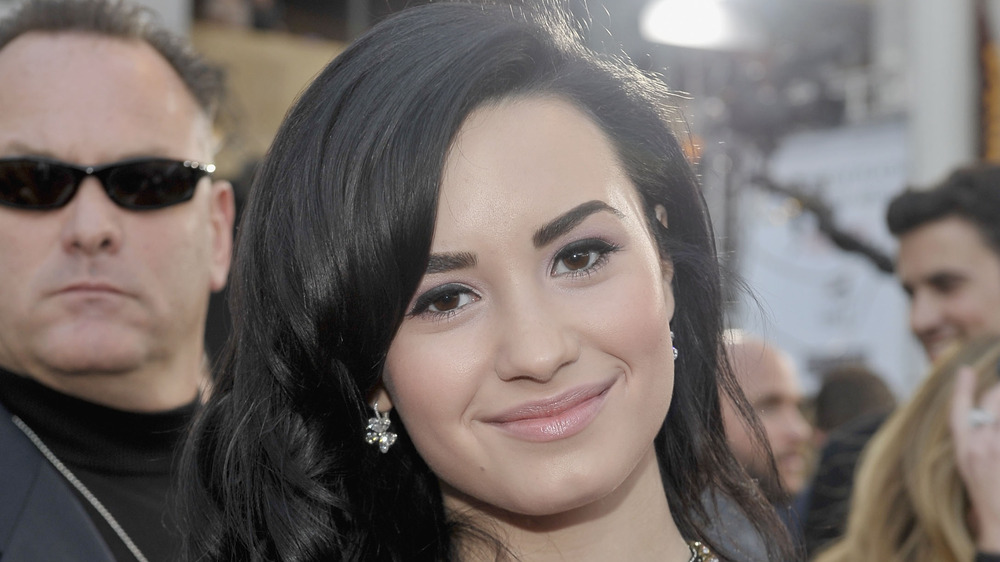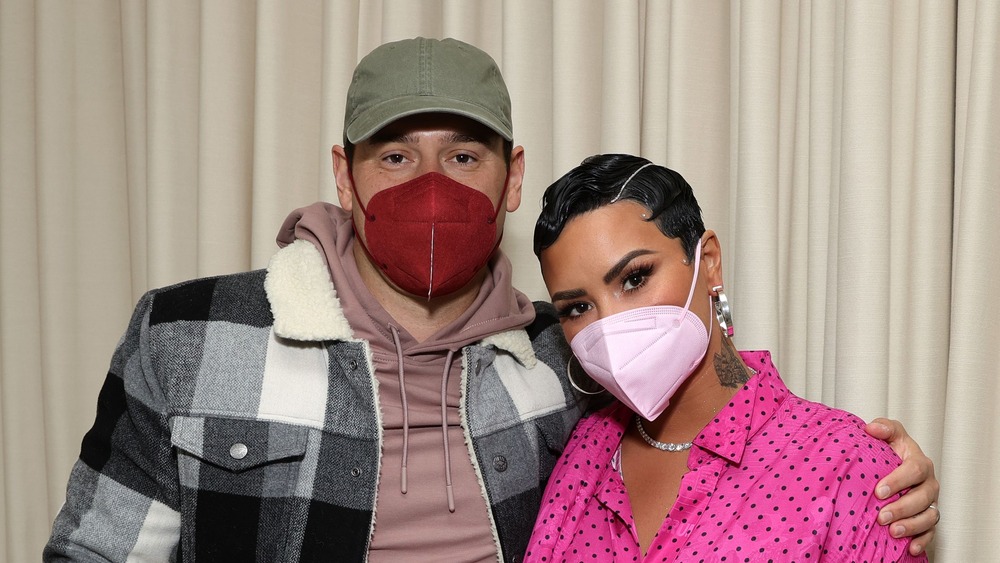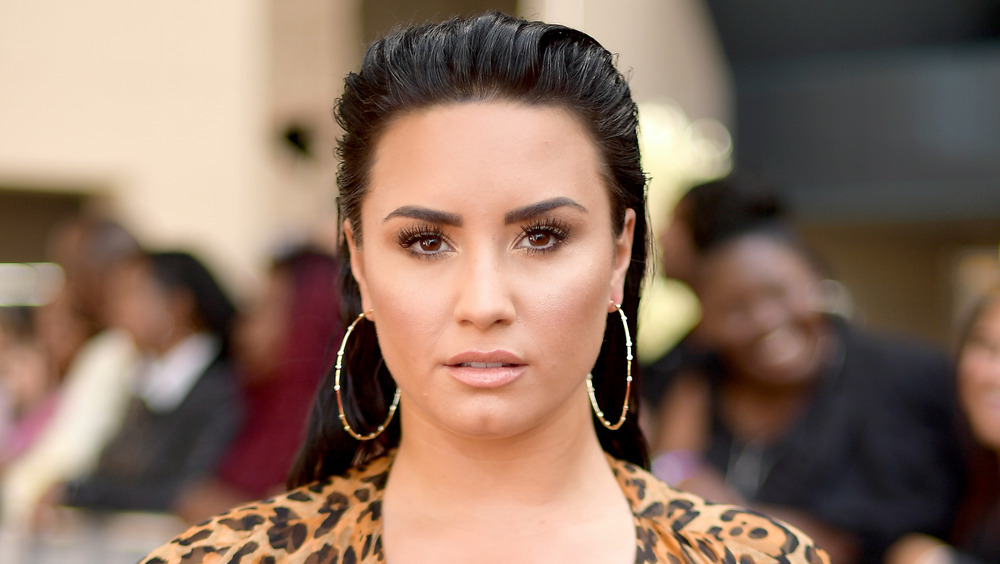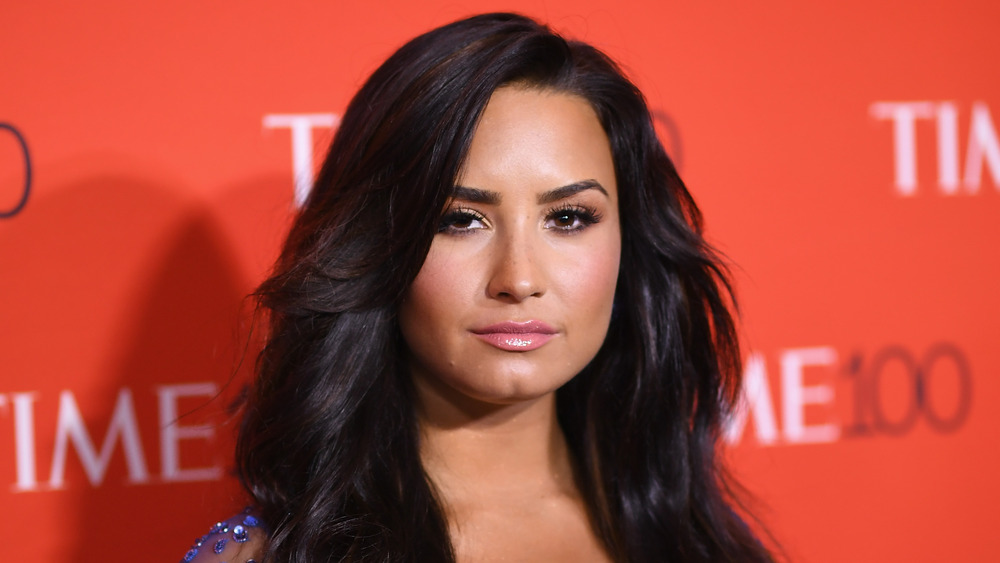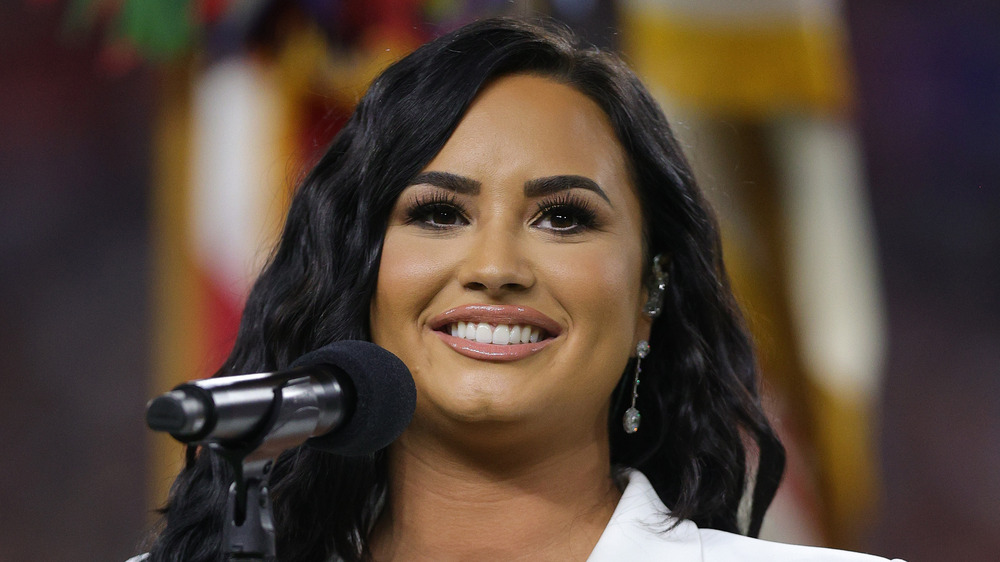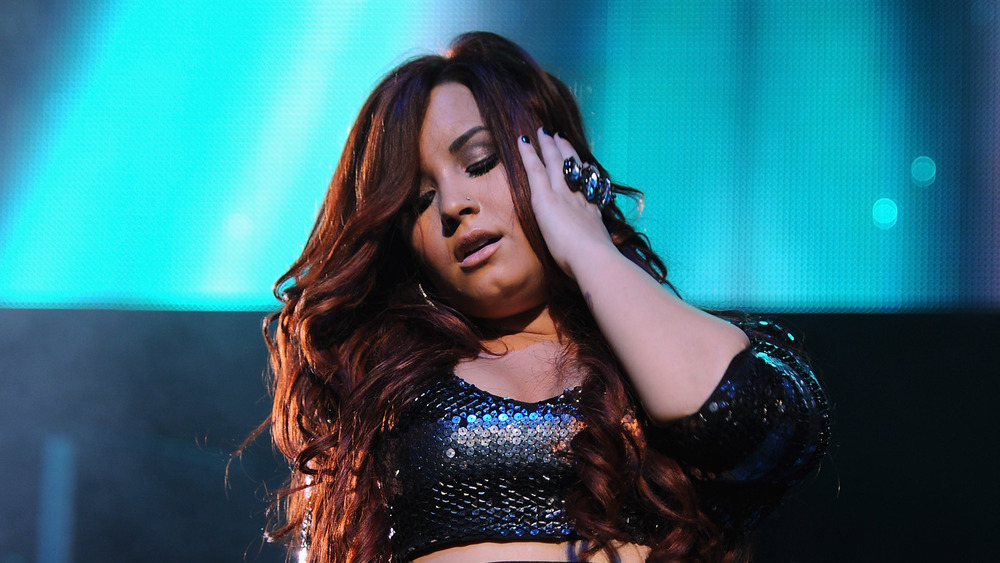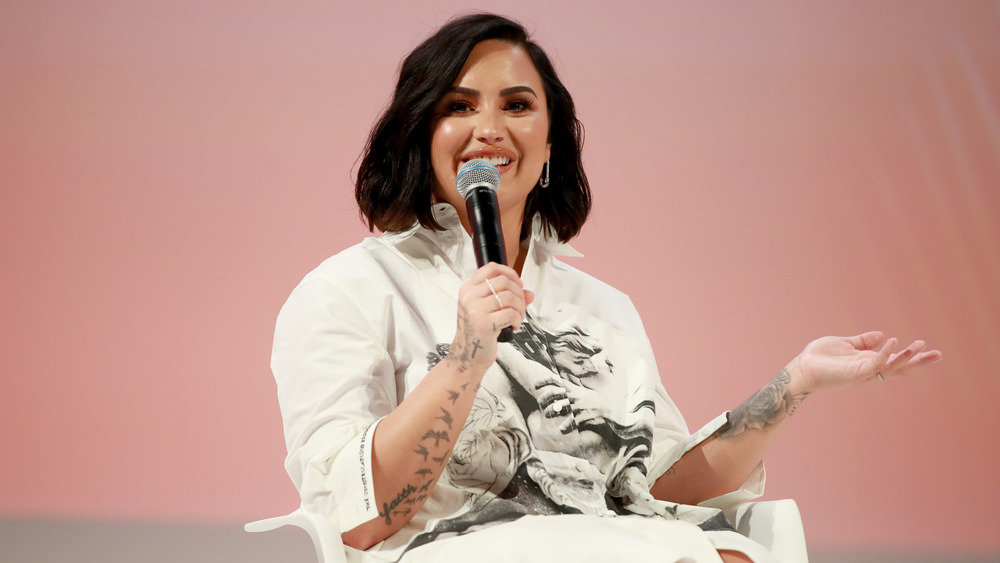Everything We Learned From 'Demi Lovato: Dancing With The Devil'
The following article includes mentions of eating disorders, drug addiction, physical and emotional abuse, and sexual assault.
Documentaries are one of the most intimate forms of art a celebrity can release. When they're done well, the subject lets viewers into private aspects of their everyday lives and talks openly about their life trials and triumphs. Streaming platforms have created a surge in popularity for documentaries, and musicians in particular are using the films to take control of their stories. Per The Guardian, Taylor Swift, Beyoncé, Lady Gaga, and even the Jonas Brothers, for example, have released successful docs to let fans see sides of them we never have before.
Singer Demi Lovato arguably likes making documentaries the most out of all of her musical peers. Before 2021, Lovato released two — 2012's Demi Lovato: Stay Strong and 2017's Demi Lovato: Simply Complicated. But according to her friend, Sarah Elizabeth "Sirah" Mitchell, in the 2021 docuseries, Demi Lovato: Dancing with the Devil, "This is the first time where we're really telling the truth, you know? For her."
Dancing with the Devil centers on the circumstances leading up to, during, and after Lovato's 2018 drug overdose — meaning that her truth is complex, sad, and hopeful all at once. We gathered every major reveal from Demi Lovato: Dancing with the Devil in one place, because now that Lovato is being the most honest she's ever been with fans, there was a lot to learn from the four-part docuseries.
Demi Lovato filmed another documentary we'll never see
Demi Lovato released two documentaries prior to Demi Lovato: Dancing with the Devil — the aforementioned Demi Lovato: Stay Strong aired on MTV in 2012 and focused on Lovato's eating disorder, other mental health struggles, and recovery. Demi Lovato: Simply Complicated was released on YouTube in 2017 and focused on Lovato's drug addiction. After the success of the latter, YouTube partnered with the singer-actor again to chronicle her Tell Me You Love Me world tour.
"I basically can't get enough of Demi Lovato," said Susanne Daniels, the Global Head of Original Content at YouTube at a 2021 SXSW panel. "[I] wanted to do a second doc that was following the world tour. But obviously that didn't happen because things got more complicated for Demi." Indeed, it's revealed in Dancing with the Devil that the tour documentary was filming a month before Lovato's overdose, so that's the "more complicated" part.
Lovato confessed in episode one of Dancing with the Devil, "In that documentary, I was allowing the cameras to see the tip of the iceberg." She added, "I wasn't showing them what I was doing behind closed doors." However, YouTube did not hesitate to partner with the "Confident" singer again. "When the opportunity arose to tell the journey that she had been through since the tour — of course we wanted to do that," said Daniels. This footage is used as B-roll throughout Dancing with the Devil and gives us insight into Lovato's life while she was in an unhealthy mindset.
She feels guilty for not helping her father
Demi Lovato has revealed that her late father, Patrick Lovato, was physically and emotionally abusive to her mother, Dianna De La Garza, as De La Garza confirmed in her 2018 memoir (via People). In episode one of Demi Lovato: Dancing with the Devil, De La Garza revealed that Demi "was around for some of the abuse," adding, "Sometimes I feel like that stayed with her for many years when I didn't know that she probably needed to work with a professional to work through some of that."
Patrick also struggled with mental health issues and addiction, and their history led to an estrangement. Demi shared in Dancing with the Devil that she cut him out of her life he died in 2013, and explained that his death was "complicated" because no one knows the exact date he died. Demi also admitted that it's hard for her to wonder what day her father died, knowing that by Father's Day he was deceased.
"That was the fear that I always had for him, was that he would end up alone — and he did. He died alone," she said. "... I also felt a lot of guilt over the years, because I've been such an advocate for mental health ... yet here was my father, who had bipolar and schizophrenia and then on top of that the disease of addiction, and I hadn't helped him the way that I would've helped other people."
If you or someone you know is dealing with domestic abuse, you can call the National Domestic Violence Hotline at 1-800-799-7233 or TTY 1-800-787-3224. You can also find more information, resources, and support at www.thehotline.org.
Demi Lovato was minutes from death following her overdose
We only knew minimal details about the physical damage Demi Lovato suffered because of her overdose before Dancing with the Devil was released. In episode two, Lovato's former assistant, Jordan Jackson, explained the horrific reality she witnessed upon letting herself into her boss' room the morning after the overdose — July 25, 2018. "There was one point where she turned blue. Like, her whole body completely turned blue," Jackson said. "And yeah, I was just like, 'She's dead for sure.'"
Thankfully, Lovato was not dead, but she revealed that she might have been minutes away. "I actually don't think people realize how bad it actually was," she said. "I had three strokes. I had a heart attack. I suffered brain damage from the strokes. I can't drive anymore, and I have blind spots in my vision ... I also had pneumonia, 'cause I asphyxiated, and multiple organ failure." Lovato noted that she is "really lucky to be alive," adding that doctors told her she only had "five to 10 more minutes" to live if Jackson had not found her.
Lovato's road to get to where she was by 2021 was not easy. When she woke up in the hospital, she was legally blind. "My little sister [Madison De La Garza] was at my bedside, and I was so blind that I couldn't see who she was even though she was standing next to me," the "Sober" singer explained. According to The New York Times, Lovato's vision has slowly improved since then.
If you or someone you know is struggling with substance abuse and mental health, please contact SAMHSA's 24-hour National Helpline at 1-800-662-HELP (4357).
The singer's friends are glad she's not a part of 'the 27 club'
"The 27 Club" is the nickname given to the group of celebrities who tragically died at the age of 27. Some of the most well-known people who died at this age are Jimi Hendrix, Janis Joplin, Jim Morrison, Kurt Cobain, Jonathan Brandis, and Amy Winehouse.
Demi Lovato's friend, Matthew Scott Montgomery, revealed in episode two of Dancing with the Devil that he was relieved when she made it to her 28th birthday. "When she turned 28 this past year, this is pretty morbid, but we kind of were like, 'You made it to 28, yes! You survived The 27 Club,'" he said. "In a way, it's like probably a subconscious, self-fulfilled prophecy. But what's different is she lived through it." Indeed, the neurologist who treated Lovato when she arrived at the hospital, Dr. Shouri Lahiri, also explained that the singer was lucky she hadn't experienced more long-term side effects of her experience. "It's not very common that you'd see someone with a drug-related overdose, with this degree of multi-organ failure, that would come out of it relatively unscathed and do as well as she has," he said.
Of surviving to tell her story today, Lovato said, "It's like a nice reminder that it wasn't my time, you know? That there was more life to be lived."
Demi Lovato's drug dealer allegedly took advantage of her in multiple ways
"What people don't realize about that night for me is that ... I didn't just overdose, I also was taken advantage of," Demi Lovato said in episode two of Dancing with the Devil. She went on to allege that her drug dealer, whom TMZ previously identified as Brandon Johnson, didn't tell her the pills she took were laced with Fentanyl.
In the docuseries, Lovato claimed that after she and her drug dealer (who's unnamed in the doc) got high, they had sex. "When they found me I was naked. I was blue. I was literally left for dead after he took advantage of me," the "Unbroken" singer claimed. "And when I woke up in the hospital, they asked if I had had consensual sex. And there was one flash that I had of him on top of me. I saw that flash, and I said yes. It actually wasn't until maybe a month after my overdose that I realized, 'Hey, you weren't in any state of mind to make a consensual decision."
Johnson previously claimed to TMZ in August 2018, "100 percent [Lovato] knew what she was taking," adding that he told her they were "aftermarket pills" that were "stronger" than pharmaceuticals. "It was unfortunate what happened," he continued. "But for people to think that there was any misconception on my behalf is absolutely ridiculous." Johnson also admitted that they sometimes had sex, but Lovato's assault allegations weren't public at the time. As of this writing, he has not responded to her latest claims.
If you or someone you know has been the victim of sexual assault, you can call the National Sexual Assault Hotline at 1-800-656-HOPE (4673) or visit RAINN.org for additional resources.
She was allegedly raped as a teenager
Demi Lovato talked about more than one alleged sexual assault in the Demi Lovato: Dancing with the Devil. "I've had my fair share of sexual trauma throughout childhood, teenage years," the "Warrior" singer said in episode two. Along with talking about the alleged sexual assault the night she overdosed, Lovato said in episode three, "I lost my virginity in a rape," adding, "We were hooking up, but I said, 'Hey, this is not going any farther, I'm a virgin, and I don't want to lose it this way.' And that didn't matter to them. They did it anyways. And I internalized it, and I told myself that it was my fault, because I still went in the room with him. I still hooked up with him."
She said that even though she was part of the group of Disney kids that "publicly said they were waiting for marriage," her first experience with sex was nothing like the way she was expected to talk about sex in public. "I didn't have the romantic like first time with anybody. That was not it for me and that sucked," Lovato continued. "... Women are typically more repressed than men, especially at 15 years old and especially as a little child star role model, who's supposed to be 'perfect.'"
Lovato didn't name her alleged abuser, but said that she reported the incident, and the person was allowed to keep their job in an unnamed movie. Lovato also said her destructive behaviors got worse as a result.
Scooter Braun almost didn't sign Demi Lovato
Demi Lovato signed a management deal with Scooter Braun in May 2019, and announced the news in an enthusiastic Instagram post. "Dreams came true today for me," she wrote in part. "... Couldn't be happier, inspired and excited to begin this next chapter with you Scooter!!!"
However, Braun admitted in Dancing with the Devil that he was close to crushing Lovato's dream. After her 2018 overdose, the singer wanted new management and only wanted to meet with Braun. "I had every intention of telling her no. I felt overwhelmed at the time. We had a plan for not only how we were going to say no, but who we were going to recommend," he said in episode three. "And once she started talking and pouring out her heart and soul, we realized that absolutely we need to manage her. She didn't need a manager, she needed a friend. She needed someone who knew what to do, but also didn't need [to rely on her career] to work." So, he signed her.
Lovato went straight from the hospital after her overdose to rehab. Soon after leaving rehab, she relapsed. Lovato was in negotiations with Braun, but he stuck by her side. "When you're dealing with addiction, it's not something that just gets cured one day," he said. "... So when she said [she relapsed] to me, and I saw how scared she was, it was just a very real, easy answer — as long as you tell me the truth, we'll work through it."
Demi Lovato has a history of going back to her alleged abusers
After her 2018 overdose, Demi Lovato went to The Cirque Lodge for rehab, but she admitted in Dancing with the Devil that her aforementioned relapse came shortly after leaving an "intensive trauma retreat." Lovato explained that she called her former drug dealer, and admitted she got high. "I wanted to rewrite his choice of violating me. I wanted it now to be my choice," she said. "... I thought, 'How did I pick up the same drugs that put me in the hospital?' I was, like, mortified at my decisions."
The relapse did not give Lovato the feelings she was searching for. "It didn't fix anything, it didn't take anything away — it just made me feel worse," she said. "But that for some reason was my way of taking the power back. All it did was bring me back to my knees of begging to God for help." Lovato also confessed that when she was 15, she did something similar with the alleged rapist who took her virginity, saying, "I called that person back a month later and tried to make it right by being in control, and all it did was just make me feel worse."
As case manager Charles Cook explained of Lovato's journey, "How do we help you create a life where to have a sense of autonomy does not mean putting yourself in these harmful situations? That being able to, you know, abuse your abuser is not where the healing is going to come from?"
Her friends suffered backlash from her fans
Fans support celebrities' careers, so they are essential — but sometimes, they take it too far and it impacts lives. Demi Lovato's friends know that all too well, especially her former creative director and choreographer, Dani Vitale.
Lovato had been celebrating Vitale's birthday on the night she overdosed in 2018, and fans took that to mean that Vitale supplied her with drugs. Now we know that Lovato was alone when she called her former drug dealer, but rumors spread online, and Vitale felt real repercussions in her professional life. "It was the hardest thing I've ever had to deal with my whole life," Vitale said in episode three of Dancing with the Devil, revealing that she had to "rethink" her whole career. "I lost all my teaching jobs," she continued. "No one wanted to bring their kid to a [SIC] apparent 'heroin dealer teacher.' I lost any artist that I was working with. They didn't want to deal with the drama." Vitale added that outlets like TMZ followed her around when she tried to go to the studio.
Sarah Elizabeth "Sirah" Mitchell experienced similar backlash simply for appearing in photos with Lovato during hard times in her life: "I got death threats, people showed up at my apartment to like threaten my life."
Lovato, who feels horrible for her friends, said, "My fans are amazing, they're very passionate. But they're a little out of line sometimes, because they want what's best for me, but don't always have all the information."
Demi Lovato eats real birthday cake now
Demi Lovato has been open about her eating disorder ever since the 2012 documentary, Demi Lovato: Stay Strong. After her rehab stay around this time, her management, then led by Phil McIntyre, put rules in place to manage the singer's bulimia. "I used to have people watching me the night before a photo shoot to make sure that I didn't binge or eat and be swollen the next day," Lovato told Bustle in 2020, revealing that her team wouldn't get her a regular cake on her birthday. Instead, they bought her a cake made out of watermelon with low-fat whipped cream on top.
Those watermelon cakes inspired the song "Melon Cake" on Lovato's latest album, Dancing with the Devil... the Art of Starting Over. In episode four of her 2021 docuseries, Lovato celebrates her birthday by having three actual birthday cakes. "We had this kind of 'aha' moment where it's like, 'This is okay. We can have three birthday cakes, because it is your birthday, and we are celebrating it. And this is something we're sharing together,'" said friend Matthew Scott Montgomery. "And I watched her in real-time realize that was something she could do, and it was really beautiful."
"That's the best part about my life today is that I'm in control of it and what I eat is my decision, what I don't eat is my decision. What I do is my decision," Lovato said, noting she's thankful for her new management team.
If you or someone you know is struggling with an eating disorder, please contact the National Eating Disorder Association's Helpline at 1-800-931-2237 or chat with one of their helpline volunteers on NEDA's website.
She revealed that she was misdiagnosed with bipolar disorder
Demi Lovato told the world she had bipolar disorder in 2011 after an incident in which she allegedly punched backup dancer Alex Welch, as headlines in episode four of Demi Lovato: Dancing with the Devil reminded us. Her diagnosis is something she's spoken openly about ever since. "It's possible to live well, feel well, and also find happiness with bipolar disorder or any other mental illness [people are] struggling with," Lovato told Women's Health in 2015.
Now, however, Lovato is clarifying her mental health status for a good reason. "I've been told that they think I was misdiagnosed when I was 18," she said in the docuseries. "I came out to the public when I found out I was bipolar, because I thought that it put a reasoning behind my actions. But what I didn't do was get a second opinion." She said that the abovementioned incident happened for many different reasons, but bipolar disorder was not one of them. "I had to grow up. I had to grow the f**k up," the "What Other People Say" singer admitted.
It's unclear if Lovato has any other mental health issues beyond her addiction and eating disorder. But whatever the status of her diagnoses, we are just happy she has found some clarity.
If you or someone you know is struggling with mental health, please contact the Crisis Text Line by texting HOME to 741741, or call the National Alliance on Mental Illness Helpline at 1-800-950-NAMI (6264).
Demi Lovato is not completely sober
Demi Lovato hasn't been completely clean and sober since her post-rehab relapse. Instead, she is what she calls "California Sober," per a song on her 2021 album. "I've learned that it doesn't work for me to say, 'I'm never going to do this again," Lovato admitted in episode four of Dancing with the Devil. Noting that she's "done" with the hard drugs that could "kill" her, she admitted that she's "been smoking weed and drinking in moderation."
But Lovato is clear that her approach isn't one that will work for everyone. "[I don't] want people to hear that and think that they can just go out and try having a drink or smoking a joint," she said. "Because it isn't for everybody. Recovery isn't a one-size-fits-all solution."
It should be noted that interventionist and trauma specialist Ken Seely disagrees with the idea that sobriety can look different for addicts. "You might not do heroin, but you may smoke pot. But the reality here [is that there] is no moderation for people that suffer with addiction," he told ET. "You can't just turn it off." Stating that "California sober" isn't a medical term, Seely claimed that Lovato's current lifestyle is "nowhere near sober."
While not everyone agrees with approaching recovery through moderation rather than abstinence, we're just glad to hear that Lovato has found control in her life in a way that works best for her.
If you or someone you know is struggling with substance abuse and mental health, please contact SAMHSA's 24-hour National Helpline at 1-800-662-HELP (4357).

